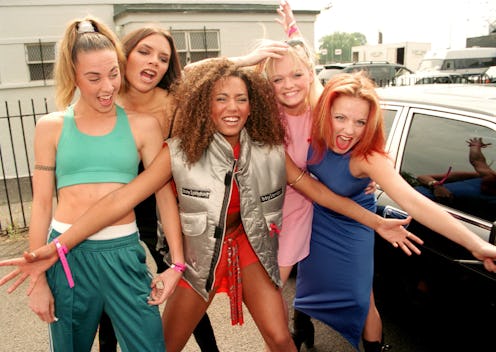Music
The Story Of How The Spice Girls Got Together Is Not How You Remember It
You better listen carefully.

Twenty-five years after their monumental debut, one of the biggest bands the world has ever seen is the focus of Channel 4’s latest documentary series Spice Girls: How Girl Power Changed Britain.
The show’s first episode centres on the group’s formation back in the mid ‘90s. But, how were the Spice Girls actually put together?
As the BBC reports, the Spice Girls originally formed back in early 1994, when Geraldine Halliwell, Melanie Brown, Melanie Chisholm, Emma Bunton, and Victoria Adams responded to an advert featured in The Stage magazine.
Per the Mirror, the full advertisement read: “R.U. 18-23 WITH THE ABILITY TO SING/DANCE R.U. STREETWISE, OUTGOING, AMBITIOUS & DEDICATED HEART MANAGEMENT LTD Are a widely successful Music Industry Management Consortium Currently forming a choreographed Singing/Dancing all Female Pop Act for a Record Recording Deal OPEN AUDITION PLEASE BRING SHEET MUSIC OR BACKING CASSETTE.”
In March 1994, the father-and-son management team, Bob and Chris Herbert, oversaw 400 hopefuls at London's Dancework Studios and split them into groups of ten. The aspiring singers were asked to learn a dance routine to Eternal’s “Stay” and to perform a solo song.
During this part of the audition, Mel B opted to perform the Whitney Houston classic “The Greatest Love Of All,” while Mel C and Victoria belted out The Pointer Sisters' “I'm So Excited” and “Mein Herr” from Cabaret, respectively.
The following month, just ten girls were asked back for a second audition, including Geri, who had missed the first round of auditions after getting sunburnt during a holiday to Spain. As Metro reports, the remaining hopefuls were then whittled down to five, including 17-year-old Michelle Stephenson.
However, it was later decided that Stephenson wasn’t a good fit for the band, and she was promptly replaced by Emma Bunton. Reflecting on her brief Spice Girls stint, Stephenson previously told the Mirror, “at the time I left the group I knew I was doing the right thing. It wasn’t my kind of music and they were not living the lifestyle I wanted.” In the Channel 4 documentary she also revealed she had been told by a member of the band’s management team that she appeared too old in comparison to the other girls.
Despite being put together by the Herberts, the band would later deny they were a manufactured group, instead claiming that they had met through auditions and even lived together before forming Spice Girls. While some members of the band, including Victoria and Geri, knew each other before the Spice Girls audition phase, the rest of the band members were not introduced until later. A source at their label Virgin told The Guardian in 1996: “They definitely met through an ad. I don't know why they're not being upfront about it.”
In 1995, following months of rehearsals Scary, Sporty, Ginger, Posh, and Baby Spice decided to cut ties with Bob and Chris Herbert, forcing Geri to devise a plan to retrieve their original recordings of the band’s future hits “Wannabe” and “2 Become 1”.
“I don't know how [Geri] actually managed to get it — everything was so Bonnie and Clyde... She had it hidden in her knickers,” Victoria recalled in her autobiography Learning to Fly.
From there, the group went on to sign with famed music manager Simon Fuller and eventually landed a record deal with Virgin Records. In 1996, the band’s debut single “Wannabe” became an overnight hit, shifting 73,000 copies during its first week and later reaching the number one spot on the UK charts, the BBC reports.
As mentioned, the story of the legendary girl band is explored in great detail throughout Channel 4’s Spice Girls: How Girl Power Changed Britain.
With hours of rare archive footage and interviews with those who worked with the band, the docuseries delves into the fascinating history of the “Spice Up Your Life” hitmakers from their ‘90s debut to the recent world tour, while also examining how the band’s message of “girl power” managed to influence modern feminism.
Spice Girls: How Girl Power Changed Britain continues on Tuesdays at 9.30 p.m. on Channel 4.